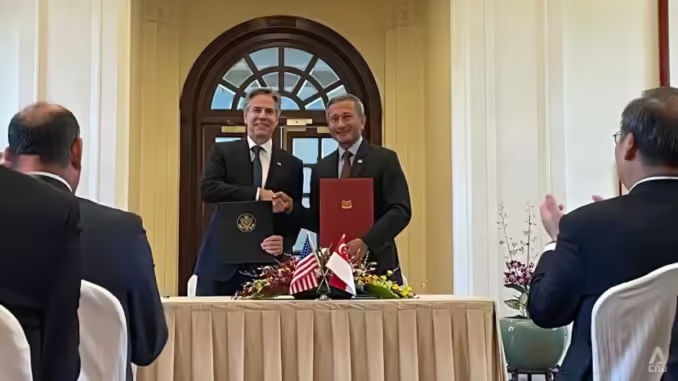
Singapore and the US inked a landmark deal on Wednesday (Jul 31) to study how nuclear technology can support climate and energy needs.
The agreement, commonly known as a “123 Agreement”, was signed by Foreign Affairs Minister Vivian Balakrishnan and US Secretary of State Antony Blinken on the second day of his official visit to Singapore.
However, Singapore has not made any decision regarding the deployment of nuclear energy in the country, read a factsheet appended to the joint statement on Wednesday.
“Any deployment decision will require detailed studies of the safety, reliability, affordability, and environmental sustainability of nuclear energy in our local context.
“Most designs of advanced nuclear reactors are still undergoing research and development and have not begun commercial operation.”
According to the statement, the agreement will enable deeper nuclear cooperation and build on Singapore and US’ strong bilateral partnership.
The agreement is expected to come into force by end-2024 and will last for 30 years.
This agreement will also enable Singapore to collaborate with other countries that use nuclear energy technologies and designs containing components or intellectual property of US origin.
Delivering his remarks at the signing ceremony, Dr Balakrishnan said Singapore views nuclear non-proliferation – which refers to preventing the spread of nuclear weapons – as essential to international peace and security.
“Current conventional nuclear technologies are not suitable for Singapore. But given advances in civil nuclear technology, we need to stay abreast of breakthroughs in this rapidly evolving field,” said Dr Balakrishnan.
He added that the agreement facilitates access to information, technological expertise, and allows us to deepen our engagements with civil nuclear experts in the US.
To date, the US has 24 active 123-Agreements including with China, India and Japan.
Several ASEAN member states also have agreements with the US. Indonesia and Vietnam’s respective deals with the US came into force in 1981 and 2014, while the Philippines’ agreement with the US entered into force earlier this month on Jul 2.
123 Agreements
123 Agreements provide a legal framework for peaceful nuclear cooperation such as the export of nuclear material, equipment, and components from the United States to another country, according to the US Department of State’s website.
In addition, they facilitate cooperation in other areas, such as educational and technological transfers and collaborations between US and partner countries.
Partners are held by a set of non-proliferation requirements to guarantee that the information obtained through this agreement will only be used for peaceful purposes.
US Congress approval is needed for the deal, which will facilitate Singapore’s access to detailed information on US nuclear energy technologies and expertise that are under export control.
There have been talks about exploring nuclear power’s feasibility as a green energy source in Singapore as the country races to decarbonise its power sector to achieve its net-zero emissions target by 2050.
A 2022 report on Singapore’s energy future commissioned by the Energy Market Authority stated that nuclear energy could supply about a tenth of the country’s energy needs by 2050.
In April, Second Minister for Trade and Industry Tan See Leng said that the country has plans to build a pool of about 100 nuclear energy experts in the medium to long run but stressed that no decision had been made on the deployment of nuclear energy.
Speaking to reporters after the signing ceremony on Wednesday, Dr Tan said recent technological advances, particularly in small modular reactors, have made it possible for Singapore to study whether newer types of developments could enable the country to be self sufficient.
“We are committed to a decarbonisation journey, a process that will end by 2050, resulting in net zero emissions. So we will do everything that’s possible to ensure that we achieve those targets but at the same time, we need to always ensure our own energy security, and also at the same time to make it cost effective for all of our fellow citizens,” said Dr Tan, adding that all options were “on the table”.
“Clean nuclear energy is one possible option but let me be clear, we have not decided on whether we’re going to eventually use nuclear energy or not.”
Through the agreement with the US, as well as other capacity-building initiatives, Singapore and the US intend to further strengthen civil nuclear cooperation to better understand how advanced nuclear energy technologies, including small modular reactors, can potentially support climate goals while balancing critical energy needs.
Those other initiatives include the US’ Foundational Infrastructure for the Responsible Use of Small Modular Reactor Technology (FIRST) program, which aims to support partners to build capabilities to better understand small modular reactors or other newer advanced nuclear energy technologies, as well as key issues such as nuclear safety, security and non-proliferation.
Under the FIRST programme, Singapore will gain access to the network of US entities involved in civilian nuclear energy, including the US National Laboratories and companies developing newer nuclear energy technologies, to facilitate our capability-building process.
FIRST will also serve as a platform to coordinate US-Singapore civil nuclear cooperation, the factsheet said.
© 2024, GDC. © GDC and www.globaldefensecorp.com. Unauthorized use and/or duplication of this material without express and written permission from this site’s author and/or owner is strictly prohibited. Excerpts and links may be used, provided that full and clear credit is given to www.globaldefensecorp.com with appropriate and specific direction to the original content.






Be the first to comment